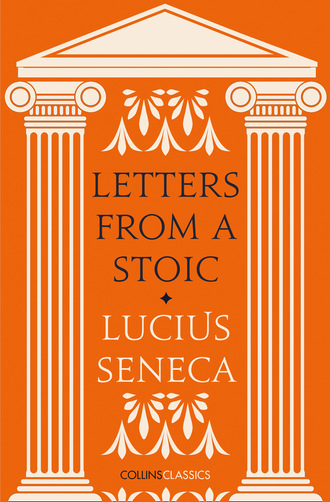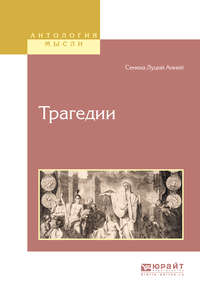
Letters from a Stoic
XII. ON OLD AGE
1Wherever I turn, I see evidences of my advancing years. I visited lately my country-place, and protested against the money which was spent on the tumble-down building. My bailiff maintained that the flaws were not due to his own carelessness; “he was doing everything possible, but the house was old.” And this was the house which grew under my own hands! What has the future in store for me, if stones of my own age are already crumbling? 2I was angry, and I embraced the first opportunity to vent my spleen in the bailiff’s presence. “It is clear,” I cried, “that these plane-trees are neglected; they have no leaves. Their branches are so gnarled and shrivelled; the boles are so rough and unkempt! This would not happen, if someone loosened the earth at their feet, and watered them.” The bailiff swore by my protecting deity that “he was doing everything possible, and never relaxed his efforts, but those trees were old.” Between you and me, I had planted those trees myself, I had seen them in their first leaf. 3Then I turned to the door and asked: “Who is that brokendown dotard? You have done well to place him at the entrance; for he is outward bound.[fn1] Where did you get him? What pleasure did it give you to take up for burial some other man’s dead?”[fn2] But the slave said: “Don’t you know me, sir? I am Felicio; you used to bring me little images.[fn3] My father was Philositus the steward, and I am your pet slave.” “The man is clean crazy,” I remarked. “Has my pet slave become a little boy again? But it is quite possible; his teeth are just dropping out.”[fn4]
4I owe it to my country-place that my old age became apparent whithersoever I turned. Let us cherish and love old age; for it is full of pleasure if one knows how to use it. Fruits are most welcome when almost over; youth is most charming at its close; the last drink delights the toper, the glass which souses him and puts the finishing touch on his drunkenness. 5Each pleasure reserves to the end the greatest delights which it contains. Life is most delightful when it is on the downward slope, but has not yet reached the abrupt decline. And I myself believe that the period which stands, so to speak, on the edge of the roof, possesses pleasures of its own. Or else the very fact of our not wanting pleasures has taken the place of the pleasures themselves. How comforting it is to have tired out one’s appetites, and to have done with them! 6“But,” you say, “it is a nuisance to be looking death in the face!” Death, however, should be looked in the face by young and old alike. We are not summoned according to our rating on the censor’s list.[fn5] Moreover, no one is so old that it would be improper for him to hope for another day of existence. And one day, mind you, is a stage on life’s journey.
Our span of life is divided into parts; it consists of large circles enclosing smaller. One circle embraces and bounds the rest; it reaches from birth to the last day of existence. The next circle limits the period of our young manhood. The third confines all of childhood in its circumference. Again, there is, in a class by itself, the year; it contains within itself all the divisions of time by the multiplication of which we get the total of life. The month is bounded by a narrower ring. The smallest circle of all is the day; but even a day has its beginning and its ending, its sunrise and its sunset. 7Hence Heraclitus, whose obscure style gave him his surname,[fn6] remarked: “One day is equal to every day.” Different persons have interpreted the saying in different ways. Some hold that days are equal in number of hours, and this is true; for if by “day” we mean twenty-four hours’ time, all days must be equal, inasmuch as the night acquires what the day loses. But others maintain that one day is equal to all days through resemblance, because the very longest space of time possesses no element which cannot be found in a single day, – namely, light and darkness, – and even to eternity day makes these alternations[fn7] more numerous, not different when it is shorter and different again when it is longer. 8Hence, every day ought to be regulated as if it closed the series, as if it rounded out and completed our existence.
Pacuvius, who by long occupancy made Syria his own,[fn8] used to hold a regular burial sacrifice in his own honour, with wine and the usual funeral feasting, and then would have himself carried from the dining-room to his chamber, while eunuchs applauded and sang in Greek to a musical accompaniment: “He has lived his life, he has lived his life!” 9Thus Pacuvius had himself carried out to burial every day. Let us, however, do from a good motive what he used to do from a debased motive; let us go to our sleep with joy and gladness; let us say:
I have lived; the course which Fortune set for me
Is finished.[fn9]
And if God is pleased to add another day, we should welcome it with glad hearts. That man is happiest, and is secure in his own possession of himself, who can await the morrow without apprehension. When a man has said: “I have lived!”, every morning he arises he receives a bonus.
10But now I ought to close my letter. “What?” you say; “shall it come to me without any little offering?” “Be not afraid; it brings something, – nay, more than something, a great deal. For what is more noble than the following saying[fn10] of which I make this letter the bearer: “It is wrong to live under constraint; but no man is constrained to live under constraint.” Of course not. On all sides lie many short and simple paths to freedom; and let us thank God that no man can be kept in life. We may spurn the very constraints that hold us. 11“Epicurus,” you reply, “uttered these words; what are you doing with another’s property?” Any truth, I maintain, is my own property. And I shall continue to heap quotations from Epicurus upon you, so that all persons who swear by the words of another, and put a value upon the speaker and not upon the thing spoken, may understand that the best ideas are common property. Farewell.
XVI. ON PHILOSOPHY, THE GUIDE OF LIFE
1It is clear to you, I am sure, Lucilius, that no man can live a happy life, or even a supportable life, without the study of wisdom; you know also that a happy life is reached when our wisdom is brought to completion, but that life is at least endurable even when our wisdom is only begun. This idea, however, clear though it is, must be strengthened and implanted more deeply by daily reflection; it is more important for you to keep the resolutions you have already made than to go on and make noble ones. You must persevere, must develop new strength by continuous study, until that which is only a good inclination becomes a good settled purpose. 2Hence you no longer need to come to me with much talk and protestations; I know that you have made great progress. I understand the feelings which prompt your words; they are not feigned or specious words. Nevertheless I shall tell you what I think, – that at present I have hopes for you, but not yet perfect trust. And I wish that you would adopt the same attitude towards yourself; there is no reason why you should put confidence in yourself too quickly and readily. Examine yourself; scrutinize and observe yourself in divers ways; but mark, before all else, whether it is in philosophy or merely in life itself[fn1] that you have made progress. 3Philosophy is no trick to catch the public; it is not devised for show. It is a matter, not of words, but of facts. It is not pursued in order that the day may yield some amusement before it is spent, or that our leisure may be relieved of a tedium that irks us. It moulds and constructs the soul; it orders our life, guides our conduct, shows us what we should do and what we should leave undone; it sits at the helm and directs our course as we waver amid uncertainties. Without it, no one can live fearlessly or in peace of mind. Countless things that happen every hour call for advice; and such advice is to be sought in philosophy.
4Perhaps someone will say: “How can philosophy help me, if Fate exists? Of what avail is philosophy, if God rules the universe? Of what avail is it, if Chance governs everything? For not only is it impossible to change things that are determined, but it is also impossible to plan beforehand against what is undetermined; either God has forestalled my plans, and decided what I am to do, or else Fortune gives no free play to my plans.” 5Whether the truth, Lucilius, lies in one or in all of these views, we must be philosophers; whether Fate binds us down by an inexorable law, or whether God as arbiter of the universe has arranged everything, or whether Chance drives and tosses human affairs without method, philosophy ought to be our defence. She will encourage us to obey God cheerfully, but Fortune defiantly; she will teach us to follow God and endure Chance. 6But it is not my purpose now to be led into a discussion as to what is within our own control, – if foreknowledge is supreme, or if a chain of fated events drags us along in its clutches, or if the sudden and the unexpected play the tyrant over us; I return now to my warning and my exhortation, that you should not allow the impulse of your spirit to weaken and grow cold. Hold fast to it and establish it firmly, in order that what is now impulse may become a habit of the mind.
7If I know you well, you have already been trying to find out, from the very beginning of my letter, what little contribution it brings to you. Sift the letter, and you will find it. You need not wonder at any genius of mine; for as yet I am lavish only with other men’s property. – But why did I say “other men”? Whatever is well said by anyone is mine. This also is a saying of Epicurus:[fn2] “If you live according to nature, you will never be poor; if you live according to opinion, you will never be rich.” 8Nature’s wants are slight; the demands of opinion are boundless. Suppose that the property of many millionaires is heaped up in your possession. Assume that fortune carries you far beyond the limits of a private income, decks you with gold, clothes you in purple, and brings you to such a degree of luxury and wealth that you can bury the earth under your marble floors; that you may not only possess, but tread upon, riches. Add statues, paintings, and whatever any art has devised for the luxury; you will only learn from such things to crave still greater.
9Natural desires are limited; but those which spring from false opinion can have no stopping-point. The false has no limits. When you are travelling on a road, there must be an end; but when astray, your wanderings are limitless. Recall your steps, therefore, from idle things, and when you would know whether that which you seek is based upon a natural or upon a misleading desire, consider whether it can stop at any definite point. If you find, after having travelled far, that there is a more distant goal always in view, you may be sure that this condition is contrary to nature. Farewell.
XVIII. ON FESTIVALS AND FASTING
1It is the month of December, and yet the city is at this very moment in a sweat. License is given to the general merrymaking. Everything resounds with mighty preparations, – as if the Saturnalia differed at all from the usual business day! So true it is that the difference is nil, that I regard as correct the remark of the man who said: “Once December was a month; now it is a year.”[fn1]
2If I had you with me, I should be glad to consult you and find out what you think should be done, – whether we ought to make no change in our daily routine, or whether, in order not to be out of sympathy with the ways of the public, we should dine in gayer fashion and doff the toga.[fn2] As it is now, we Romans have changed our dress for the sake of pleasure and holiday-making, though in former times that was only customary when the State was disturbed and had fallen on evil days. 3I am sure that, if I know you aright, playing the part of an umpire you would have wished that we should be neither like the liberty-capped[fn3] throng in all ways, nor in all ways unlike them; unless, perhaps, this is just the season when we ought to lay down the law to the soul, and bid it be alone in refraining from pleasures just when the whole mob has let itself go in pleasures; for this is the surest proof which a man can get of his own constancy, if he neither seeks the things which are seductive and allure him to luxury, nor is led into them. 4It shows much more courage to remain dry and sober when the mob is drunk and vomiting; but it shows greater self-control to refuse to withdraw oneself and to do what the crowd does, but in a different way, – thus neither making oneself conspicuous nor becoming one of the crowd. For one may keep holiday without extravagance.
5I am so firmly determined, however, to test the constancy of your mind that, drawing from the teachings of great men, I shall give you also a lesson: Set aside a certain number of days, during which you shall be content with the scantiest and cheapest fare, with coarse and rough dress, saying to yourself the while: “Is this the condition that I feared?” 6It is precisely in times of immunity from care that the soul should toughen itself beforehand for occasions of greater stress, and it is while Fortune is kind that it should fortify itself against her violence. In days of peace the soldier performs manoeuvres, throws up earthworks with no enemy in sight, and wearies himself by gratuitous toil, in order that he may be equal to unavoidable toil. If you would not have a man flinch when the crisis comes, train him before it comes. Such is the course which those men[fn4] have followed who, in their imitation of poverty, have every month come almost to want, that they might never recoil from what they had so often rehearsed.
7You need not suppose that I mean meals like Timon’s, or “paupers’ huts,”[fn5] or any other device which luxurious millionaires use to beguile the tedium of their lives. Let the pallet be a real one, and the coarse cloak; let the bread be hard and grimy. Endure all this for three or four days at a time, sometimes for more, so that it may be a test of yourself instead of a mere hobby. Then, I assure you, my dear Lucilius, you will leap for joy when filled with a pennyworth of food, and you will understand that a man’s peace of mind does not depend upon Fortune; for, even when angry she grants enough for our needs.
8There is no reason, however, why you should think that you are doing anything great; for you will merely be doing what many thousands of slaves and many thousands of poor men are doing every day. But you may credit yourself with this item, – that you will not be doing it under compulsion, and that it will be as easy for you to endure it permanently as to make the experiment from time to time. Let us practise our strokes on the “dummy”;[fn6] let us become intimate with poverty, so that Fortune may not catch us off our guard. We shall be rich with all the more comfort, if we once learn how far poverty is from being a burden.
9Even Epicurus, the teacher of pleasure, used to observe stated intervals, during which he satisfied his hunger in niggardly fashion; he wished to see whether he thereby fell short of full and complete happiness, and, if so, by what amount he fell short, and whether this amount was worth purchasing at the price of great effort. At any rate, he makes such a statement in the well known letter written to Polyaenus in the archonship of Charinus.[fn7] Indeed, he boasts that he himself lived on less than a penny, but that Metrodorus, whose progress was not yet so great, needed a whole penny. 10Do you think that there can be fullness on such fare? Yes, and there is pleasure also, – not that shifty and fleeting Pleasure which needs a fillip now and then, but a pleasure that is steadfast and sure. For though water, barley-meal, and crusts of barley-bread, are not a cheerful diet, yet it is the highest kind of Pleasure to be able to derive pleasure from this sort of food, and to have reduced one’s needs to that modicum which no unfairness of Fortune can snatch away. 11Even prison fare is more generous; and those who have been set apart for capital punishment are not so meanly fed by the man who is to execute them. Therefore, what a noble soul must one have, to descend of one’s own free will to a diet which even those who have been sentenced to death have not to fear! This is indeed forestalling the spearthrusts of Fortune.
12So begin, my dear Lucilius, to follow the custom of these men, and set apart certain days on which you shall withdraw from your business and make yourself at home with the scantiest fare. Establish business relations with poverty.
Dare, O my friend, to scorn the sight of wealth,
And mould thyself to kinship with thy God.[fn8]
13For he alone is in kinship with God who has scorned wealth. Of course I do not forbid you to possess it, but I would have you reach the point at which you possess it dauntlessly; this can be accomplished only by persuading yourself that you can live happily without it as well as with it, and by regarding riches always as likely to elude you.
14But now I must begin to fold up my letter. “Settle your debts first,” you cry. Here is a draft on Epicurus; he will pay down the sum: “Ungoverned anger begets madness.”[fn9] You cannot help knowing the truth of these words, since you have had not only slaves, but also enemies. 15But indeed this emotion blazes out against all sorts of persons; it springs from love as much as from hate, and shows itself not less in serious matters than in jest and sport. And it makes no difference how important the provocation may be, but into what kind of soul it penetrates. Similarly with fire; it does not matter how great is the flame, but what it falls upon. For solid timbers have repelled a very great fire; conversely, dry and easily inflammable stuff nourishes the slightest spark into a conflagration. So it is with anger, my dear Lucilius; the outcome of a mighty anger is madness, and hence anger should be avoided, not merely that we may escape excess, but that we may have a healthy mind. Farewell.
XXVII. ON OLD AGE AND DEATH
1I was just lately telling you that I was within sight of old age.[fn1] I am now afraid that I have left old age behind me. For some other word would now apply to my years, or at any rate to my body; since old age means a time of life that is weary rather than crushed. You may rate me in the worn-out class, – of those who are nearing the end.
2Nevertheless, I offer thanks to myself, with you as witness; for I feel that age has done no damage to my mind, though I feel its effects on my constitution. Only my vices, and the outward aids to these vices, have reached senility; my mind is strong and rejoices that it has but slight connexion with the body. It has laid aside the greater part of its load. It is alert; it takes issue with me on the subject of old age; it declares that old age is its time of bloom. 3Let me take it at its word, and let it make the most of the advantages it possesses. The mind bids me do some thinking and consider how much of this peace of spirit and moderation of character I owe to wisdom and how much to my time of life; it bids me distinguish carefully what I cannot do and what I do not want to do …[fn2] For why should one complain or regard it as a disadvantage, if powers which ought to come to an end have failed? 4“But,” you say, “it is the greatest possible disadvantage to be worn out and to die off, or rather, if I may speak literally, to melt away! For we are not suddenly smitten and laid low; we are worn away, and every day reduces our powers to a certain extent.”
But is there any better end to it all than to glide off to one’s proper haven, when nature slips the cable? Not that there is anything painful in a shock and a sudden departure from existence; it is merely because this other way of departure is easy, – a gradual withdrawal. I, at any rate, as if the test were at hand and the day were come which is to pronounce its decision concerning all the years of my life, watch over myself and commune thus with myself: 5“The showing which we have made up to the present time, in word or deed, counts for nothing. All this is but a trifling and deceitful pledge of our spirit, and is wrapped in much charlatanism. I shall leave it to Death to determine what progress I have made. Therefore with no faint heart I am making ready for the day when, putting aside all stage artifice and actor’s rouge, I am to pass judgment upon myself, – whether I am merely declaiming brave sentiments, or whether I really feel them; whether all the bold threats I have uttered against fortune are a pretence and a farce. 6Put aside the opinion of the world; it is always wavering and always takes both sides. Put aside the studies which you have pursued throughout your life; Death will deliver the final judgment in your case. This is what I mean: your debates and learned talks, your maxims gathered from the teachings of the wise, your cultured conversation, – all these afford no proof of the real strength of your soul. Even the most timid man can deliver a bold speech. What you have done in the past will be manifest only at the time when you draw your last breath. I accept the terms; I do not shrink from the decision.” 7This is what I say to myself, but I would have you think that I have said it to you also. You are younger; but what does that matter? There is no fixed count of our years. You do not know where death awaits you; so be ready for it everywhere.
8I was just intending to stop, and my hand was making ready for the closing sentence; but the rites are still to be performed and the travelling money for the letter disbursed. And just assume that I am not telling where I intend to borrow the necessary sum; you know upon whose coffers I depend. Wait for me but a moment, and I will pay you from my own account;[fn3] meanwhile, Epicurus will oblige me with these words:[fn4] “Think on death,” or rather, if you prefer the phrase, on “migration to heaven.” 9The meaning is clear, – that it is a wonderful thing to learn thoroughly how to die. You may deem it superfluous to learn a text that can be used only once; but that is just the reason why we ought to think on a thing. When we can never prove whether we really know a thing, we must always be learning it. 10“Think on death.” In saying this, he bids us think on freedom. He who has learned to die has unlearned slavery; he is above any external power, or, at any rate, he is beyond it. What terrors have prisons and bonds and bars for him? His way out is clear. There is only one chain which binds us to life, and that is the love of life. The chain may not be cast off, but it may be rubbed away, so that, when necessity shall demand, nothing may retard or hinder us from being ready to do at once that which at some time we are bound to do. Farewell.
XXVII. ON THE GOOD WHICH ABIDES
1“What,” say you, “are you giving me advice? Indeed, have you already advised yourself, already corrected your own faults? Is this the reason why you have leisure to reform other men?” No, I am not so shameless as to undertake to cure my fellow-men when I am ill myself. I am, however, discussing with you troubles which concern us both, and sharing the remedy with you, just as if we were lying ill in the same hospital. Listen to me, therefore, as you would if I were talking to myself. I am admitting you to my inmost thoughts, and am having it out with myself, merely making use of you as my pretext. 2I keep crying out to myself: “Count your years, and you will be ashamed to desire and pursue the same things you desired in your boyhood days. Of this one thing make sure against your dying day, – let your faults die before you die. Away with those disordered pleasures, which must be dearly paid for; it is not only those which are to come that harm me, but also those which have come and gone. Just as crimes, even if they have not been detected when they were committed, do not allow anxiety to end with them; so with guilty pleasures, regret remains even after the pleasures are over. They are not substantial, they are not trustworthy; even if they do not harm us, they are fleeting. 3Cast about rather for some good which will abide. But there can be no such good except as the soul discovers it for itself within itself. Virtue alone affords everlasting and peace-giving joy; even if some obstacle arise, it is but like an intervening cloud, which floats beneath the sun but never prevails against it.”









